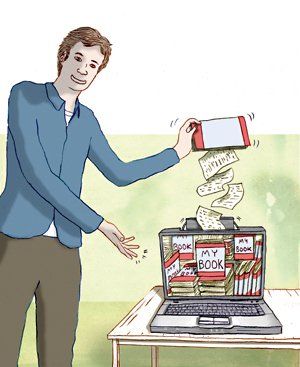
Boyd Morrison was finishing a Ph.D. in industrial engineering when he wrote his first novel. Five agents rejected it. Nine years later he tried again, and this time he did get an agent—after nearly three years and three novels. But that turned out to be some kind of cosmic tease, because 25 publishers turned down The Ark. With nothing left to lose, Morrison uploaded The Ark and his two other unpublished novels to Amazon's Kindle store in March 2009. Within three months, he was selling books at a rate of 4,000 a month—a number that attracted the attention of the same publishers who had rejected him. This May, when The Ark was released in hardcover from Simon & Schuster, it became the first self-published Kindle book to be picked up by a Big Six publisher. Morrison says that the phone call from his agent telling him he'd finally see his book in print was "one of the most amazing moments of my life."
Until recently, reviewers and booksellers looked down on self-published authors the way Anna Wintour scorns Dress Barn. Now new writers and established authors alike are increasingly taking publishing into their own hands, and the publishing establishment is paying attention. According to a recent Bowker report, the market for "nontraditional books" in the United States grew by more than 750,000 new titles in 2009—a 181 percent increase over 2008. Five of the top 100 bestsellers in the Kindle store—which now produces more sales than Amazon's hardcover list—are currently self-published.
Bob Young, CEO of print-on-demand service Lulu.com, says that the publishing and distributing of books online will not be the old book industry on a new platform. It will be a new industry, dependent not on bestsellers but on niche publications. Young compares Lulu to eBay, which many feared would kill the traditional auction business. "Ten years and 60 billion transactions on eBay later," Young says, "Christie's, Sotheby's, and the farm auctioneers are still doing fine. That's because it was not people with Picassos who were selling on eBay. And in our case, it won't be John Grisham selling millions of copies on Lulu."
Maybe Grisham isn't a Lulu customer yet, but writer John Edgar Wideman (Philadelphia Fire) is. Wideman's latest collection of short stories, Briefs, came out from Lulu this spring. In a traditional paperback publishing deal, the author keeps a mere 8 to 9 percent of royalties. Under most self-publishing agreements, authors keep 70 to 80 percent of their profits, with the remaining cut going to their distributor. "It's an even playing field for the first time," says J. A. Konrath, a thriller author (Whiskey Sour) who plans to release all his future novels as self-published Kindle books. "The gatekeepers have become who they should have been in the first place: the readers."
Konrath began self-publishing e-books in April 2009. He quickly realized that by cutting out the middleman, he was making as much money on a single $2.99 e-book as he would on a $25 hardcover. "I started to be able to pay my mortgage on e-book money, then pay my bills on e-book money," Konrath says. "I'm going to make over $100,000 this year, and a lot of the money is from the books that New York publishers rejected." Konrath attributes his strong sales on Amazon to user-generated ratings and reviews on message boards, as well as to the low price of his e-books. "Three dollars is a cup of coffee," Konrath says. "Wouldn't you rather have eight hours of entertainment from a book?"
Uncommon Knowledge
Newsweek is committed to challenging conventional wisdom and finding connections in the search for common ground.
Newsweek is committed to challenging conventional wisdom and finding connections in the search for common ground.
About the writer
To read how Newsweek uses AI as a newsroom tool, Click here.








